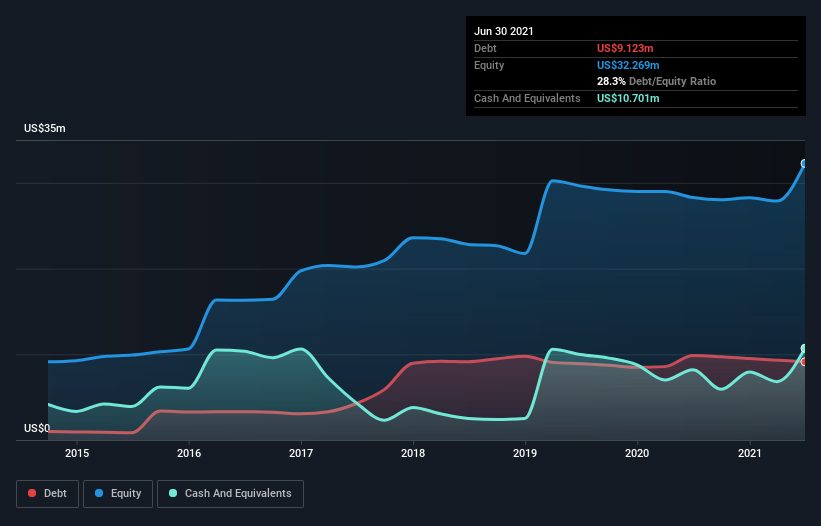- United States
- /
- Biotech
- /
- NasdaqCM:ICCC
Health Check: How Prudently Does ImmuCell (NASDAQ:ICCC) Use Debt?

Howard Marks put it nicely when he said that, rather than worrying about share price volatility, 'The possibility of permanent loss is the risk I worry about... and every practical investor I know worries about.' So it might be obvious that you need to consider debt, when you think about how risky any given stock is, because too much debt can sink a company. We note that ImmuCell Corporation (NASDAQ:ICCC) does have debt on its balance sheet. But should shareholders be worried about its use of debt?
What Risk Does Debt Bring?
Debt assists a business until the business has trouble paying it off, either with new capital or with free cash flow. If things get really bad, the lenders can take control of the business. However, a more usual (but still expensive) situation is where a company must dilute shareholders at a cheap share price simply to get debt under control. Having said that, the most common situation is where a company manages its debt reasonably well - and to its own advantage. When we examine debt levels, we first consider both cash and debt levels, together.
View our latest analysis for ImmuCell
What Is ImmuCell's Debt?
The image below, which you can click on for greater detail, shows that ImmuCell had debt of US$9.12m at the end of June 2021, a reduction from US$9.86m over a year. However, its balance sheet shows it holds US$10.7m in cash, so it actually has US$1.58m net cash.

How Strong Is ImmuCell's Balance Sheet?
Zooming in on the latest balance sheet data, we can see that ImmuCell had liabilities of US$2.03m due within 12 months and liabilities of US$9.43m due beyond that. Offsetting these obligations, it had cash of US$10.7m as well as receivables valued at US$2.06m due within 12 months. So it can boast US$1.30m more liquid assets than total liabilities.
This state of affairs indicates that ImmuCell's balance sheet looks quite solid, as its total liabilities are just about equal to its liquid assets. So while it's hard to imagine that the US$77.2m company is struggling for cash, we still think it's worth monitoring its balance sheet. Succinctly put, ImmuCell boasts net cash, so it's fair to say it does not have a heavy debt load! There's no doubt that we learn most about debt from the balance sheet. But it is ImmuCell's earnings that will influence how the balance sheet holds up in the future. So when considering debt, it's definitely worth looking at the earnings trend. Click here for an interactive snapshot.
In the last year ImmuCell wasn't profitable at an EBIT level, but managed to grow its revenue by 11%, to US$16m. That rate of growth is a bit slow for our taste, but it takes all types to make a world.
So How Risky Is ImmuCell?
By their very nature companies that are losing money are more risky than those with a long history of profitability. And the fact is that over the last twelve months ImmuCell lost money at the earnings before interest and tax (EBIT) line. And over the same period it saw negative free cash outflow of US$3.4m and booked a US$434k accounting loss. But the saving grace is the US$1.58m on the balance sheet. That kitty means the company can keep spending for growth for at least two years, at current rates. Overall, its balance sheet doesn't seem overly risky, at the moment, but we're always cautious until we see the positive free cash flow. When analysing debt levels, the balance sheet is the obvious place to start. But ultimately, every company can contain risks that exist outside of the balance sheet. We've identified 3 warning signs with ImmuCell (at least 1 which is significant) , and understanding them should be part of your investment process.
At the end of the day, it's often better to focus on companies that are free from net debt. You can access our special list of such companies (all with a track record of profit growth). It's free.
If you’re looking to trade ImmuCell, open an account with the lowest-cost* platform trusted by professionals, Interactive Brokers. Their clients from over 200 countries and territories trade stocks, options, futures, forex, bonds and funds worldwide from a single integrated account. Promoted
New: AI Stock Screener & Alerts
Our new AI Stock Screener scans the market every day to uncover opportunities.
• Dividend Powerhouses (3%+ Yield)
• Undervalued Small Caps with Insider Buying
• High growth Tech and AI Companies
Or build your own from over 50 metrics.
This article by Simply Wall St is general in nature. We provide commentary based on historical data and analyst forecasts only using an unbiased methodology and our articles are not intended to be financial advice. It does not constitute a recommendation to buy or sell any stock, and does not take account of your objectives, or your financial situation. We aim to bring you long-term focused analysis driven by fundamental data. Note that our analysis may not factor in the latest price-sensitive company announcements or qualitative material. Simply Wall St has no position in any stocks mentioned.
*Interactive Brokers Rated Lowest Cost Broker by StockBrokers.com Annual Online Review 2020
Have feedback on this article? Concerned about the content? Get in touch with us directly. Alternatively, email editorial-team (at) simplywallst.com.
About NasdaqCM:ICCC
ImmuCell
An animal health company, develops, manufactures, and sells products that enhance the health and productivity of dairy and beef cattle in the United States and internationally.
Excellent balance sheet slight.
Similar Companies
Market Insights
Community Narratives



